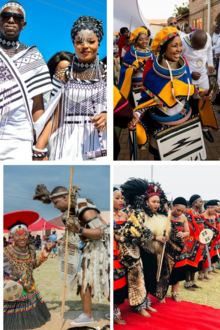
Back شعب نجونى (مجموعه عرقيه فى جنوب افريقيا) ARZ Нгуні (народы) BE Nguni German Ngunoj EO Nguni Spanish Nguni EU Ngunit Finnish Nguni (peuple) French न्गूनी लोग HI Ngoni Italian
 Top left, Xhosa; Top right, Ndebele; Bottom left, Zulu; Bottom right, Swati | |
| Total population | |
|---|---|
| 31,618,000[citation needed] | |
| Languages | |
| Nguni languages IsiXhosa, IsiZulu, Siswati, Ndebele | |
| Religion | |
| Christianity and (uThixo or Qamata) Unkulunkulu | |
| Related ethnic groups | |
| Sotho-Tswana peoples, Tsonga people, Khoisan, San people and Ngoni people |
The Nguni people are a linguistic cultural group of Bantu cattle herders who migrated from central Africa into Southern Africa, made up of ethnic groups formed from iron age and proto-agrarians, with offshoots in neighboring colonially-created countries in Southern Africa. Swazi (or Swati) people live in both South Africa and Eswatini, while Ndebele people live in both South Africa and Zimbabwe.
The Xhosa were pastoralist from late iron age Bantu and proto-Bantu agro-pastoralists and established sub-federations under AmaXhosa kingdom, which are (AbaThembu, AmaMpondo, and AmaMpondomise) in the 5th century AD.The recent homeland of the Xhosa people is marked by lands in the Eastern Cape from the Gamtoos River up to Umzimkhulu near Natal, which confined and restricted their pastoral ancestors from the rest of the Cape by an expanding and setting of the VOC Cape Colony frontier.
This closed frontier was set in the late 1700s.
The Xhosa often called the "Red Blanket People," are Bantu people living in south-east South Africa and in the last two centuries throughout the southern and central-southern parts of the country.
Both the Ndebele of Zimbabwe and the Ngoni migrated northward out of South Africa in the early 19th century, during a politically tumultuous era that included the Mfecane and Great Trek.
In South Africa, the historic Nguni kingdoms of the Ndebele, Swazi, Xhosa, and Zulu are in the present-day provinces of the Western Cape, Eastern Cape, Gauteng, KwaZulu-Natal, Limpopo and Mpumalanga. The most notable of these kingdoms are the Zulu Kingdom, which was ruled by Shaka, a warrior king whose conquest took place in the early nineteenth century, and the Xhosa Kingdom, existed for 11 generations before the start of the Frontier Wars in 1779.
Overall, the Nguni cultural group is made up of the eMbo, Lala, Ntungwa, Hlubi, Xhosa, Mthethwa Paramountcy, Ngidi, Ndwandwe, Zulu, Ngoni, Swati and Ndebele ethnic groups.
In Zimbabwe, the Ndebele people live primarily in the province of Matabeleland.[1]
- ^ "isiNdebele for beginners. Northern Ndebele language in Africa". www.northernndebele.blogspot.com. Retrieved November 12, 2021.